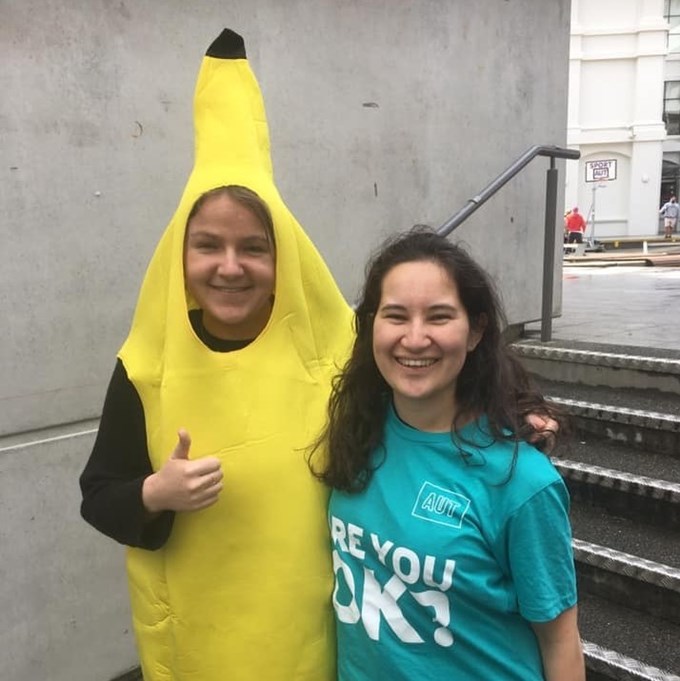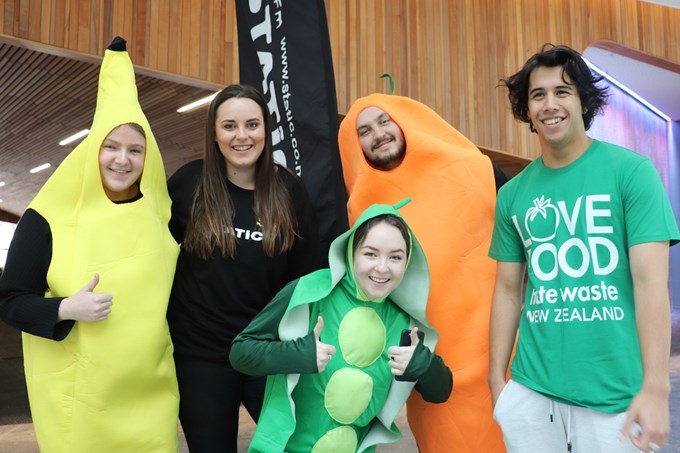AUT students were caught off guard by human-sized fruits and vegetables running around the city campus recently.
The Static FM stunt was a light-hearted attempt to raise awareness among AUT students about the serious issue of wasting food.
Food scraps make up around 45 per cent of the weight of an average Auckland household’s rubbish bin or bag. That means around 100,000 tonnes of domestic food scraps are currently sent to landfill each year from Auckland alone. If the city’s commercial food scraps are included, it is estimated that 180,000 tonnes are landfilled annually.
When food scraps are thrown in the rubbish, they get sent to landfill with the rest of our waste. As the food breaks down, it releases methane, a harmful greenhouse gas, into the air. If food scraps were a country they would be the third-largest producer of greenhouse gas emissions behind China and the United States.
According to the Love Food Hate Waste national food waste prevention study, people aged 16 to 24 are more likely to throw away food compared to other age groups. This made the campus a great target for the campaign.
Bethany Cogger, a spokesperson from Static FM, says the group of AUT students wanted to show their peers that wasting food is a real issue and help them understand why.
“We felt the need to use our platform and raise awareness around the environmental impact of wasting food. Younger generations will be the most affected by climate change, so it’s important for us to understand the simple things we can do to help reduce our impact.”
‘WANTED’ posters dotted the campus halls, asking onlookers to save the larger-than-life-sized bean, carrot and banana. Students were encouraged to ‘save’ the food characters and those who snapped a photo and shared it on social media went in the draw to win an eco prize pack.
Cogger says it was a fun way to engage with students, share important information, and get everyone thinking about how they can divert food scraps from landfill.

AUT student Hannah-Jayne Rodokal was randomly selected as the prize winner for her photo with the giant-sized banana, although she had a higher chance of winning the prize pack after managing to capture all three food characters.
How to turn food scraps into valuable resources
Auckland Council promotes a four-tiered approach to managing food scraps, based on the waste hierarchy principles of:
- Reduce – Love Food Hate Waste focuses on educating Kiwis to reduce food scraps in the first instance. For more information about Love Food Hate Waste and tips on how to reduce the amount of food your household throws in the bin, visit lovefoodhatewaste or head to their Facebook and Instagram pages.
- Food Rescue – Auckland Council supports programmes such as Kiwi Harvest that take food that is deemed as waste and turn it into valuable and nutritious meals for people in need.
- Reuse – With support from Auckland Council, the Compost Collective educates and encourages homes and communities to reuse unavoidable food scraps by composting at home. They provide training, workshops and ongoing community engagement. Find out more about composting, worm farms, and using bokashi bins on the Compost Collective
- Recover – Auckland Council currently offers a kerbside food scraps collection service to around 17,000 households in Papakura and a further 2000 households on the North Shore. The service is due to roll out to urban households across the region from October 2021, giving Aucklanders another option to beneficially reuse and recover food scraps.


